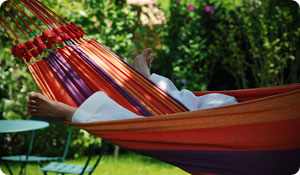
Tempted to sleep out in a hammock on a warm summer night? Or take a hammock nap in the late afternoon? It may turn out to be the best sleep you ever got.
If you're a parent, you know that rocking a baby is the best way to get him to sleep. If you have a grandmother, you may have seen how quickly she falls asleep in a rocking chair. Now, a Swiss study says rocking might also be the best way to get you to sleep.
If you've ever fallen asleep in a hammock, you know how easy it is to nod off while gently swaying back and forth in a rocking "bed." Scientists from the University of Geneva questioned why this is so and set out to find out what makes a hammock or a rocking cradle so conducive to falling asleep. They found that rocking not only helps you fall asleep faster but can also help you stay asleep
During the study, the brain activities of 12 well-rested men, aged 22 to 30, were monitored by electroencephalogram (EEG) while they napped on either a gently rocking bed or a regular bed. None of these men normally napped on a regular basis. Every one of the men who slept on a rocking bed fell asleep sooner and spent more time in a deeper sleep state than those who slept on a stationary bed.
Gentle rocking is soothing behavior that is in keeping with the environmental conditions most likely to promote and accommodate a good night's sleep. The researchers also say that rocking has a synchronizing effect on the brain that enhances natural sleep rhythms. Simply put, rocking causes a rhythmic stimulation in your brain that basically lulls you to sleep.
While monitoring the brain activity of the study participants who napped on a rocking bed, the researchers noted that the men's brains were producing more pulses, known as sleep spindles, which help prevent outside disturbances from causing arousal. Heavy sleepers are known to produce more sleep spindles than light sleepers. Sleep spindles, which are only produced during sleep, also play a role in memory retention.
Further research will help these sleep scientists discover how rocking affects longer sleeping times, how it affects memory and whether or not gentle swaying can help people with true sleep disorders get more and higher quality rest.
Sources:
Bayer, L, et al "Rocking Synchronizes Brain Waves During a Short Nap." Current Biology: Jun 2011 21(12) Web. 7 Jul 2011http://www.cell.com/current-biology/abstract/S0960-9822(11)00539-2
http://download.cell.com/current-biology/pdf/PIIS0960982211005392.pdf?intermediate=true
Dang-Vu, T, et al. "Spontaneous Brain Rhythms Predict Sleep Stability in the Face of Noise." Current Biology: 20(5);R626-R627 10 Aug 2010 Web. 7 Jul 2011
http://www.cell.com/current-biology/abstract/S0960-9822(10)00778-5





